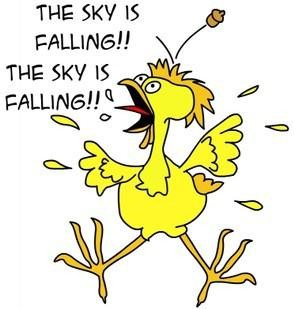
This old man thinks a lot about our fractured, polarized, angry and, in my opinion, deteriorating society. Beyond political arenas, there seems to be no segment of our society exempt from the consequences of an undefined human virus of epidemic proportions which is spreading unimpeded.
The preponderance of effort by all parties is directed at the destruction of an opposing position/narrative, no matter what the cost. A few informed and intelligent people strive to identify underlying causes, but their voices are akin to stewards on the sinking Titanic telling panicked passengers to “be calm, everything will be ok”.
I am confident the lens history will reveal what is Imperceptible today. Prospects of a “lessons learned” debrief brings little comfort. With decreasing optimism of having the opportunity for hindsight, I have chosen to identify weapons being employed in this battle to the death. Perhaps if we can understand the combatants’ weapons they can be disarmed and progress toward peaceful co-existence can begin. (Assuming no infringement on the 2nd Amendment, of course)
Most recently, it occurred to me “the sky is falling” is the weapon of choice for both sides. If you are unfamiliar with the story of Chicken Little, you can read it HERE.
“The sky is falling” is a euphemism for fear-mongering .
Fearmongering or scaremongering is the spreading of frightening and exaggerated rumors of an impending danger or the habit or tactic of purposely and needlessly arousing public fear about an issue. Fear-mongering – whether justified or not – can sometimes elicit a societal response called Chicken Little syndrome, described as “inferring catastrophic conclusions possibly resulting in paralysis”. It has also been defined as “a sense of despair or passivity which blocks the audience from actions”. The term began appearing in the 1950s and the phenomenon has been noted in many different societal contexts. (Wikipedia)
Although, fear-mongering, as defined, is reprehensible to any reasoned person, I find it amazingly ironic that utilization of “the sky is falling” is ubiquitous. Not particularly surprising In a culture that assumes people are effectively and efficiently motivated by fear. Leadership in families, churches, companies, government and organizations regularly, if not intuitively, resort to “the sky is falling”.
The subject is complicated by the reality, in some cases, “the sky is falling” is absolutely required. If there is a tornado, avalanche or similar imminent hreat, to not assert “the sky is falling” may well be criminal. On the other hand, to assert falsely “the sky is falling”, i.e., “fire” in a crowded theatre is criminal.
In my opinion, both sides are screaming “the sky is falling”, feeling justified by deeply held beliefs that the sky, is, in deed, falling. I hold little hope of compromise or conversion.
A few thoughts about choosing “the sky is falling”.
- Even with a “clear and present danger” real risk of unintended collateral damage exists.
- People who believe “the sky is falling” often suspend good judgement and common sense.
- “the sky is falling” produces results
- “the sky is falling” creates movement but it doesn’t change people.
- Panicked groups cannot be controlled.
The pressing question for me is, how should I respond to “the sky is falling”? Chicken LittlE is helpful.
- When encountering an unexplained and/or unanticipated threat (acorn), resist knee-jerk assumptions. Gather facts necessary to determine the magnitude of danger.
- Seek reliable counsel for confirmation and appropriate action.
- Only when confident of the reality and magnitude of threat, and, having clarity necessary for a response, should you alert others.
- When fearful We are most vulnerable to seduction we would never consider otherwise.
- Resist the temptation think the worst.
Doing some cursory research on “the sky is falling” i.e. Chicken Little story, I came across some interesting insights.
The moral to be drawn changes, depending on the version. Where there is a “happy ending”, the moral is not to be a “Chicken” but to have courage. In other versions where the birds are eaten by the fox, the fable is interpreted as a warning not to believe everything one is told.
A very early example containing the basic motif and many of the elements of the tale is some 25 centuries old and appears in the Buddhist scriptures. the Buddha, upon hearing about some particular religious practices, comments that there is no special merit in them, but rather that they are “like the noise the hare heard.” He then tells the story of a hare disturbed by a falling fruit who believes that the earth is coming to an end. The hare starts a stampede among the other animals until a lion halts them, investigates the cause of the panic and restores calm. The fable teaches the necessity for deductive reasoning and subsequent investigation.
We need a lion.